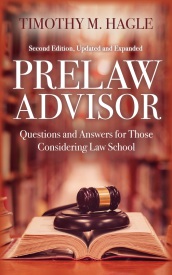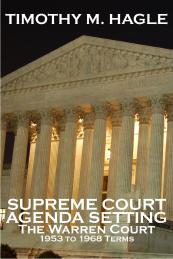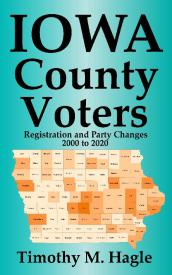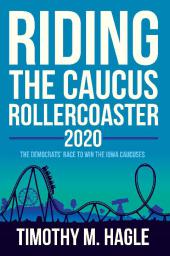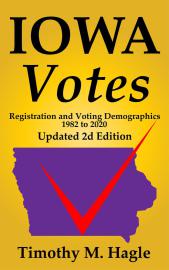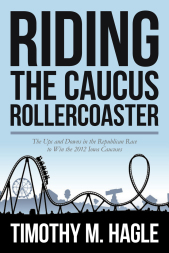
Contact Info
347 Schaeffer Hall
319-335-2348
timothy-hagle@uiowa.edu
Twitter: @ProfHagle
Fall 2024 Office Hours
Tue & Th: 4:45-6:15
Mailing Address
Dept of Political Science
341 Schaeffer Hall
20 E. Washington Street
The University of Iowa
Iowa City, Iowa 52242
News
Posted updated Prelaw FAQ for UI students
New Book, Riding the Caucus Rollercoaster 2024, published in paperback and for Kindle devices.
Posted updates to 12 papers in Iowa Voting Series for 2022 election data
New Book, Supreme Court Agenda Setting: The Warren Court, published for Kindle devices and computers with Kindle reader.
Published updated and expanded edition of Prelaw Advisor in paperback and for Kindle readers
My books
Why Study Mathematics?
In one of his books author and mathematician John Allen Paulos (Innumeracy, Beyond Numeracy) provides reasons to study mathematics and notes some of the societal consequences of mathematical naiveté. The following is adapted from "More Dismal Math Scores for U.S. Students: X, Y, and U" contained in A Mathematician Reads the Newspaper (Basic Books, 1995: 164-168).
As a mathematician, I'm often challenged to come up with compelling reasons to study mathematics. If the questioner is serious, I reply that there are three reasons or, more accurately, three broad classes of reasons to study mathematics. Only the first and most basic class is practical. It pertains to job skills and the needs of science and technology. The second concerns the understandings that are essential to an informed and effective citizenry. The last class of reasons involves considerations of curiosity, beauty, playfulness, perhaps even transcendence and wisdom.
And what are the costs incurred if we as a society continue in our perversely innumerate ways?
The economic cost of mathematical ignorance is gauged, in part, by people who, though they can perform the basic arithmetical operations, don't know when to do one and when to do another: clerks who are perplexed by discounts and sales taxes, medical personnel who have difficulty reckoning correct dosages, quality control managers who don't understand simple statistical concepts. The supply of mathematically capable individuals is also a factor in the U.S.'s position in many new scientific technologies, among them fuel-efficient engines, precision bearings, optical glasses, industrial instrumentation, laser devices, and electronic consumer products.
As Labor Secretary Robert Reich and others have written, those jobs and job classifications requiring higher mathematics, language, and reasoning abilities are growing much more rapidly than those that do not. Nevertheless, enrollment in college-level mathematics is down, and fewer and fewer American students are majoring in math or in the growing number of fields that require it.
The social cost of our mathematical naïveté is harder to measure, but gullible citizens are a demagogue's dream. Charlatans yearn for people who can't recognize trade-offs between contrary desiderata; who lack a visceral grasp of the difference between millions of dollars for the National Endowment for the Arts and hundreds of billions of dollars for the savings-and-loan bailout; or who insist on paralyzing regulation of rare and minuscule health risks, whose cumulative expense helps to ensure the incomparably greater health hazard of poverty. Almost every political issue-health care, welfare reform, NAFTA, crime-has a quantitative aspect. And, as the FDA is just now recognizing, the worst drug problem in this country is not crack or cocaine but cigarette smoking, which kills 400,000 Americans annually, the equivalent of three fully loaded jumbo jets crashing each and every day of the year. Or consider Lani Guinier's mathematical suggestions regarding the Voting Rights Act, or the possible economic and ecological implications of chaos theory, or the statistical snares inherent in the interpreting of test results, whether they be for academic achievement or the presence of drugs.
Regarding the third class of reasons, I think it's only fair to say that the "cost" of the philosophical impoverishment resulting from mathematical illiteracy is one that millions of Americans gleefully assume, Still, there is evidence that people respond enthusiastically to mathematical topics as long as they are not labeled as such. People enjoy complicated numerical and mechanical puzzles (Rubik's Cube, for example, the number of whose possible states-4 x 1019-is greater than the distance in inches that light travels in a century); crossword puzzles and word play (including certain kinds of humor); board games; all sorts of gambling; paradoxes and brain teasers. Part of the enjoyment is traceable to their quasi-mathematical charm. We have an innate attraction to pattern structure, and symmetry that mathematics and science develop and refine. Certainly Bertrand Russell is not alone in prizing the subject's "cold and austere beauty," and many are excited by Andrew Wiles's likely proof of Fermat's last theorem, even if it is of little earthly use.
With these reasons to study mathematics, why don't American students do better? Enough's been written about our many social problems, so rather than plunging into that dreary story let me end this segment with five misconceptions about mathematics. Cumulatively, they contribute significantly to poor pedagogy in school and needles handicaps on the job.
Probably the most harmful misconception is that mathematics is essentially a matter of computation. Believing this is roughly equivalent to believing that writing essays is the same as typing them. Or, to vary the analogy, imagine the interest in literature that would be engendered if every English class focused exclusively on punctuation. Of course, this is not to say that calculating mentally or with paper and pencil is not important. Nor is it meant to discourage the excellent habit of estimating quantities. It is merely to assert that in mathematics, as in other endeavors, the big picture is seldom presented.
Another misconception about the subject is that it is strictly hierarchical; first comes arithmetic, followed in lockstep by algebra, calculus, and differential equations, after which arrive abstract algebra, complex analysis, and so on. There is undeniably a cumulative aspect to mathematics, but it is less significant than many think. A third misconception concerns what, for lack of a better term, I'll call storytelling. An effective educational strategy since ancient times, storytelling places a question into context, demonstrates its relation to other questions, and concisely lays out some seminal idea. The rigid view that draws a sharp distinction between formal math and narrative may explain why this plain means is too seldom employed in mathematics education.
Parental expectations can be effective in thwarting the effects of the next misconception, which is frequently signaled by comments such as "I'm a people person, not a numbers person" or "Math was always my worst subject." Although it is undoubtedly true that some people have considerably more mathematical talent than others, mathematics is not only for the few. There are also disparities in writing ability, but people rarely counsel students to give up on their English courses because they're not going to make it as novelists.
The last misconception is the romantic belief that a concern with mathematics is somehow numbing, making one unresponsive to, say, stone farmhouses in the late afternoon sun. Asking How Much, How Many, or How Likely is thought to make one a member of Napoleon's despised "nation of shopkeepers." Sentiments such as these are as potent as they are baseless.
I'll forgo discussing the curricular and pedagogical suggestions that follow from this discussion, except to note that the newspaper is an undervalued source of examples and ideas for mathematics classes at various levels. Once an idea or notion is grounded in some real-life situation, it can later be generalized, idealized, and aestheticized.
